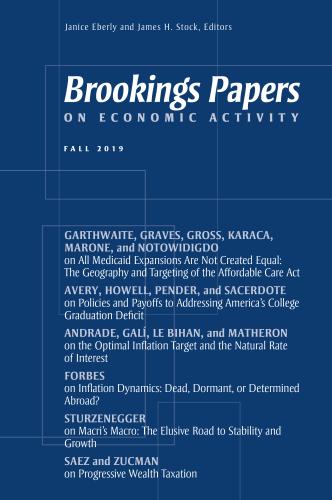Studies in this week’s Hutchins Roundup find that people who exhaust unemployment benefits offset only a small share of lost income through other safety net programs, US monetary policy announcements significantly impact emerging economies, and more.
Want to receive the Hutchins Roundup as an email? Sign up here to get it in your inbox every Thursday.
Increased participation in alternative safety net programs only slightly offsets losses of unemployment insurance
Examining individuals who were jobless after their unemployment benefits ran out during the 2001 and 2007-2009 recessions and their aftermaths, Jesse Rothstein of the University of California, Berkeley, and Robert B. Valletta from the San Francisco Fed find that the loss of unemployment benefits is only slightly offset by increased participation in other safety net programs, such as food stamps. In particular, other government programs offset less than one tenth of the lost jobless benefit, and total family income falls by 13 percent. Income losses are worse for single parents and low-income households, they find. The authors conclude that unemployment compensation plays a uniquely important role in the US social safety net.
US monetary policy announcements significantly impact emerging economies
Using data on 20 of the largest emerging countries during the Federal Reserve’s exercise of unconventional monetary policies from 2008 through 2016, the World Bank’s Poonam Gupta, Oliver Masetti, and David Rosenblatt find that surprise FOMC announcements of contractionary policies result in larger movements in exchange rates, equity prices, and bond yields in emerging economies than do surprise expansionary announcements. This is consistent with the literature suggesting that financial markets react more strongly to negative news than to positive news, the authors note. They find that these spillovers are economically significant, with the probability of emerging economies experiencing large daily movements in asset prices is almost three to five times larger following FOMC announcements that result in large changes in US Treasury yields than on non-FOMC days.
Firm-size tax incentives not targeting R&D investment can hinder firm productivity and growth
Many countries tax small firms at a lower rate in order support employment, spur innovation, and alleviate barriers to growth. However, these policies may discourage firms from growing beyond a certain size. Using firm-level data on four European countries from 2001-2013, Anna Shabunina and co-authors at the IMF find that size-related tax incentives that do not explicitly target R&D investment allocate resources to less productive firms and discourage firms from growing. They argue that fiscal policy that aims to support small firms should address potential disincentive effects and that any incentives should be temporary, target young and innovative firms, and focus explicitly on R&D investment.
Chart of the Week: U.S. Treasury projected to run short of cash in October unless debt ceiling raised

Quote of the week: “Generally, if you sort of asked me would I sign up for a 4.3 percent unemployment rate and inflation running about 1½ percent, the answer is absolutely,” says New York Fed President William Dudley.
“This is actually a pretty good place to be. We’re pretty close to what we think is full employment. Inflation’s a little bit lower than what we would like. But we think if the labor market continues to tighten, wages will gradually pick up, and with that we’ll see inflation get back to 2 percent.”
The Brookings Institution is committed to quality, independence, and impact.
We are supported by a diverse array of funders. In line with our values and policies, each Brookings publication represents the sole views of its author(s).









Commentary
Hutchins Roundup: Exhausted unemployment insurance, US monetary policy announcements, and more
Thursday, June 22, 2017